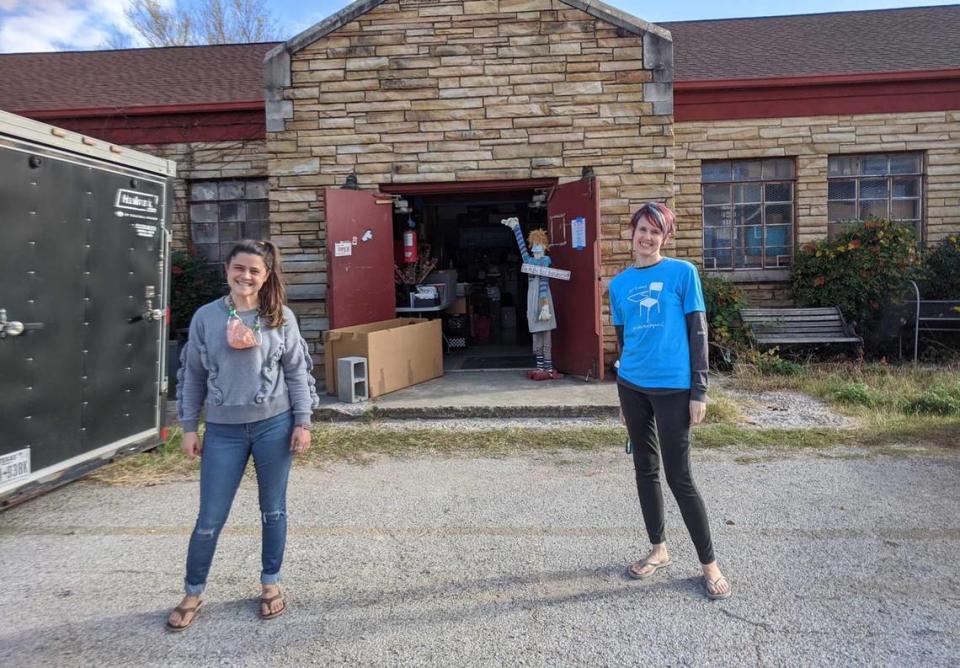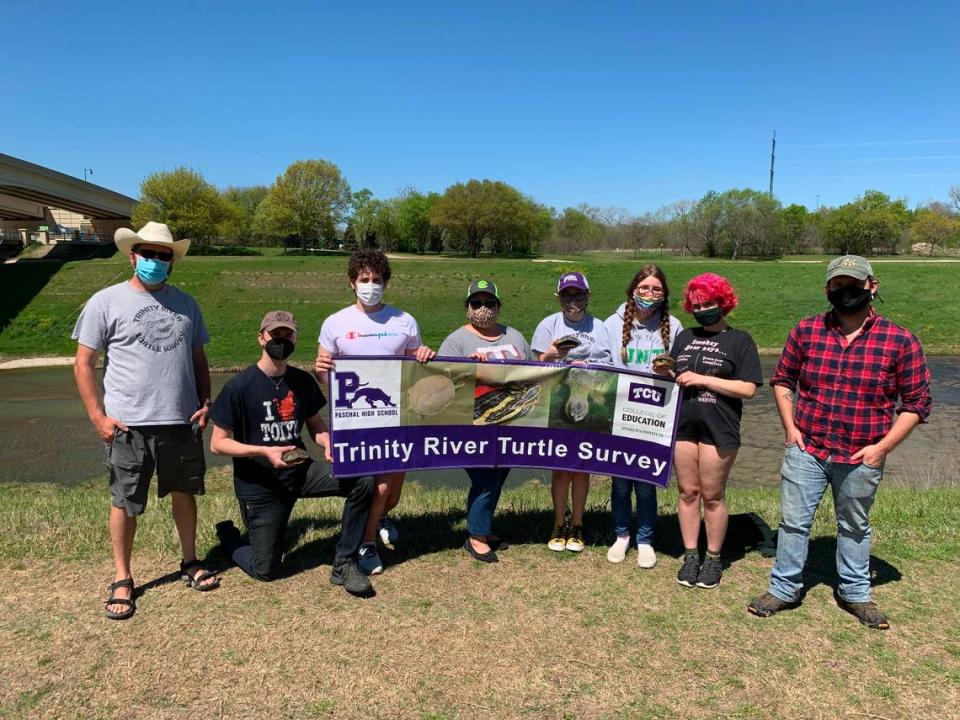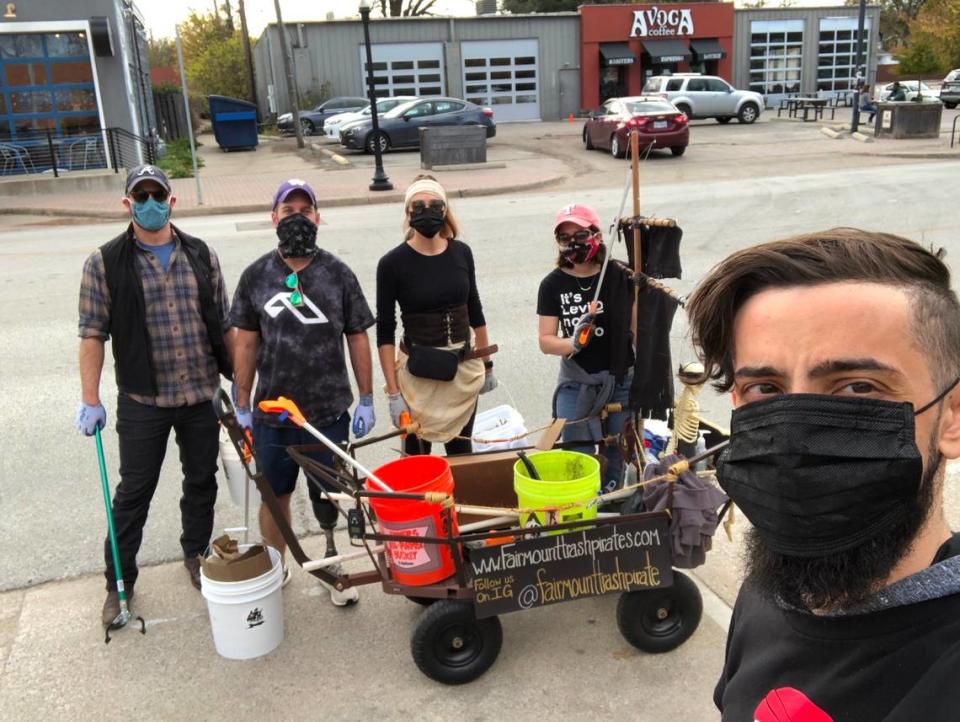Reducing waste and saving turtles. These Fort Worth residents have ideas to do it all
Millions of Americans gather each year for community cleanups and environmental events to celebrate Earth Day, which falls on April 22. On the other 364 days of the year, leaders across North Texas are at work to reduce the amount of waste directed toward landfills or to educate kids about the importance of protecting wildlife.
Fort Worth and Tarrant County are home to many of these advocates, some with deep roots in the area and others who have found purpose in improving their new neighborhoods. Facing significant environmental challenges in North Texas, four Fort Worth residents have taken action in hopes of inspiring future generations to pick up the baton.
‘Crazy idea’ to reduce waste helps teachers
Vanessa Barker and Taylor Willis’ love for the environment started in the classrooms of Fort Worth’s William James Middle School, where the two friends joined the eco club and were inspired by a seventh grade science teacher. When Barker returned to Texas in 2014 after working in the New York fashion industry, the pair seemed to pick up right where they left off, becoming co-founders of The Welman Project.
The five-year-old nonprofit organization takes leftover materials from more than 100 North Texas companies — anything from arts and crafts supplies to fabrics and containers — and distributes them to educators across the Metroplex, who often spend money out of pocket to stock their classrooms. Barker carried out a version of this idea in New York before taking it home to Fort Worth.
“I noticed a lot of waste after these 15 minute fashion shows, and then a lack of resources in the school that I happened to be working in at the time,” Barker said. “I asked the producers if I could basically save some of the stuff in the dumpsters or the cargo van and go knock on some school doors in Manhattan. Lo and behold, it worked.”
With recycling programs costing cities more each year and China rejecting the import of most recycled materials, reuse has become the best option for keeping trash out of landfills, Willis said. The nonprofit accepts donations from individuals but is especially focused on reducing corporate waste and educating business leaders about how they can make their signs or office supplies last longer, according to Willis.
“It’s been really incredible how much the corporate community has embraced this crazy idea that started in our living rooms,” Willis said. “We’ve never had to seek out donations, they’ve just come to us because they’re looking for a way to reduce their waste.”
Especially during the pandemic, it’s become more important for kids to have access to “tactile learning,” or participate in physical activities to learn, Barker said.

“They’re playing with these really neat, unique things and they’re seeing possibility with what other people have thrown away,” Barker said. “We’re hoping that these students who are experiencing Welman through their teachers will be amazing stewards for the environment in the future.”
Last year, The Welman Project said it served 1,383 educators from 480 schools and educational nonprofits, rescuing 23,296 cubic feet of waste from landfills. There are no “grandiose” plans to become a worldwide organization, Barker said, but she would love to have more warehouse locations for teachers to shop, especially in the Dallas area.
They may come closer to that goal if they win The Pitch, a competition hosted by the United Way of Metropolitan Dallas that will culminate in a virtual event at 6 p.m. Thursday. The five finalists are fighting for a chunk of $250,000 in funding, and viewers can vote for their favorite to win the $25,000 Audience Choice Award.
“The Welman Project shouldn’t have to exist,” Barker said. “Teachers should be well-funded, well-paid and have what they need, and everyone should be more responsible with how they consume and divert waste … But for now, we want to do good and be that hub for the community to come and learn and make an impact.”
Teaching environmental science through turtle research
Nearly every day in elementary and middle school, Andrew Brinker spent time catching and releasing turtles at a pond near his house. He worked for six and a half years in the reptile department at the Fort Worth Zoo, taking care of “all kinds of really cool turtles.”
So when Brinker began teaching at Paschal High School more than 13 years ago, it was no surprise that turtles became part of the curriculum.
Over the past three years, the environmental science teacher has taken his research to the next level through the Trinity River Turtle Survey, an innovative research project that brings students to the river each month to catch, mark, measure and release turtles back into the water. COVID-19 sidelined student visits for about a year, until a small group was able to return to the Trinity in late March.

“Through the surveys, we can tell which species are there, and how many of each species there are in that section of the river,” Brinker said. “We are also doing a project where we take toenail clippings from the turtles and then we are able to determine from the toenail clippings how much mercury is in their muscle and liver tissue.”
Funded through a grant from TCU’s College of Education, the survey has earned Brinker statewide recognition and, more importantly to Brinker, given students the opportunity to present research at science conferences. Last year, he was named Environmental Educator of the Year by the Texas Commission for Environmental Quality.
“The most important thing is to get students a chance to participate in real science,” Brinker said. “Getting the students outside actually collecting data and presenting posters at different conferences was the goal.”
Through Brinker’s hands-on style of teaching, involving field trips to the Botanic Gardens and a city wastewater plant, Paschal students are able to learn about issues that affect their quality of life, he said. Some students know that they are not supposed to eat fish out of the Trinity, but don’t know the specific chemicals that have entered the river due to human activity, Brinker said.
“When I taught biology and was teaching photosynthesis, that’s important but it might be something that you forget after you take the test,” Brinker said. “Whereas with environmental science, we learn about air pollution in Fort Worth and if you’re going to go jogging in the summertime, it’s better to do it in the morning before it heats up and the ozone spikes. That kind of stuff is important for everyday life.”
Brinker plans to continue with the survey, adding that turtles in this section of the Trinity are “doing really well.” Texas wildlife researchers expressed concerns in 2018 that turtles were being overharvested and pushed for a ban on commercial turtle trapping for resale. There are not many conservation issues with this turtle population near the Trinity, Brinker said.
While eight Paschal students were able to present posters at a virtual research conference last fall, he wants students to have the chance to go to a conference in another state or possibly another country. Through his teaching awards, Brinker has more than $7,000 in the bank to spend on future projects for students.
Paschal students have set an example of “citizen science” that others can follow, he said.
“I get to help shape the future a little bit because I get to make them aware of all these environmental issues we’re facing,” Brinker said. “I’ve had tons of students go out to study environmental science, so hopefully they’re going to be part of the solution to some of our problems in the future.”
Fairmount Trash Pirates declare ‘war on waste’
After moving to Fort Worth to attend law school in 2012, Anthony “Ace” Eichler was struck by the amount of litter in his community. Once he and his wife Rose were hired by Lockheed Martin, Eichler took charge of the company’s Adopt-a-Highway cleanup program and often picked up trash in parks near his Fairmount home.
It wasn’t long before those efforts didn’t feel like enough. Starting in the spring of 2019, Eichler started asking friends to come along as he walked around the neighborhood with trash bags and tongs.
“I’m really just trying to get as many people in the city involved in direct action as I can,” Eichler said. “I’m not a person who sits around and waits for results. If it’s something that I see as an issue, then I’m going to go handle it.”
With many neighbors confined to their homes in the early days of the COVID-19 pandemic, Eichler began to brainstorm ways to make cleaning up the neighborhood more exciting and less repetitive. At first, he decided to dress up as a pirate and drag a wagon around with the hopes that onlookers would be inspired to join.
But his group soon decided to take the idea a step further with a pirate ship-shaped wagon. The idea was inspired by Fairmount resident Perry Justin’s handmade tiny trash trucks emblazoned with the slogan “Keep Fort Worth Beautiful.”

In September, Justin helped build and design the ship wagon, now decked out with a flag, speakers and up to six five-gallon buckets to hold litter.
“There’s a lot of places you can travel in the United States and in the world where they take really good care of the area they live, and this doesn’t translate around here for some reason,” Eichler said. “My wife and I, we just said: ‘Enough. We’re going to do something about this.’”
Since last fall, the Fairmount Trash Pirates have branched out with a website and social media accounts documenting their adventures across Fort Worth. Their core group of volunteers have adopted Fire Station Park and Magnolia Avenue, and after collecting about 200 pounds of litter during the city’s Cowtown Cleanup in March, Eichler said the pirates will focus on clearing trash from the Trinity River.
Their pirate ship wagon has already begun to attract the right kind of attention — just what Eichler and fellow “admirals” had hoped for.
“We did a cleanup recently where we were just walking down Magnolia and someone saw us and said, ‘Hey, can I join?’” Eichler said. “Our showing has increased a lot recently, whether that’s neighbors or people in the area joining or just people walking off the street and asking if they can help.”

